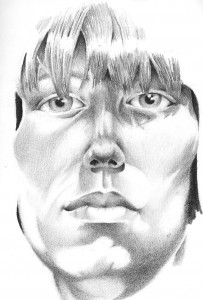So, I’m starting to bring up some fairly random ideas in the world of counselling. Not a structured “one week builds on the next” sort of approach. I’ve spent lots of time talking about setting goals in counselling because that’s what we do… or help our clients do: set goals and discover the path to reach the goals. Is that the process in counselling  that brings therapeutic progress? Is that all there is? My thought today is about the difference between attending to the content of the session as well as paying attention to the process and I exemplify that difference in terms of art creation (see, I told you it was rather random). In my own creation of art, I find myself focusing my attention back and forth between the finite detail in a drawing and the overall concept/composition. I teach drawing classes and I see novice artists start a portrait (for example) at drawing the finite detail of the eye. They continue that eye until it becomes the best eye they can accomplish, then they move to the next detail (one content area to the next) without really paying attention to how one detail is related to the next and how that fits into the overall picture (process) only to be disappointed when the drawing is finished and it is all out of proportion and askew. Counselling can be the same… we focus on all of the details the clients give us and, if we are not careful, we can forget to purposely draw back, observe the process: how the client is relating to the therapist; is their emotional discourse congruent with their body language, etc. One can observe the actual physical dissonance that is created when an individual is providing the details of an event or the content of their story; but their body language is showing that they are wanting to be more closed off, or, perhaps of being too vulnerable in the session.
that brings therapeutic progress? Is that all there is? My thought today is about the difference between attending to the content of the session as well as paying attention to the process and I exemplify that difference in terms of art creation (see, I told you it was rather random). In my own creation of art, I find myself focusing my attention back and forth between the finite detail in a drawing and the overall concept/composition. I teach drawing classes and I see novice artists start a portrait (for example) at drawing the finite detail of the eye. They continue that eye until it becomes the best eye they can accomplish, then they move to the next detail (one content area to the next) without really paying attention to how one detail is related to the next and how that fits into the overall picture (process) only to be disappointed when the drawing is finished and it is all out of proportion and askew. Counselling can be the same… we focus on all of the details the clients give us and, if we are not careful, we can forget to purposely draw back, observe the process: how the client is relating to the therapist; is their emotional discourse congruent with their body language, etc. One can observe the actual physical dissonance that is created when an individual is providing the details of an event or the content of their story; but their body language is showing that they are wanting to be more closed off, or, perhaps of being too vulnerable in the session.
I guess it is like everyday interactions. We meet someone and our attention is actually focused on the whole; their looks, their openness; the broader picture, and as we “feel good” about the overall, we start probing for details to express our interest (getting name, occupation, etc). Is the content of those details what’s important in forming that relationship or the process of the interaction that expresses to each individual that they are interested in the other?
Back to my initial thoughts about setting goals; is it the actual goal setting and accomplishment (the content) that produces change or is it the process of obtaining that information that shows that we are interested in their story – whatever that may be – and thus simply validates them as a person. Is the response to the “miracle question” in solution focused therapy simply the most efficient path to setting goals or does the formation of solution pictures and the optimistic approach (the process) simply plan the seed of hope and shift a person’s mindset from pessimism to one of hope?
*The views expressed by our authors are personal opinions and do not necessarily reflect the views of the CCPA
Dear Curtis Stevens,
I really enjoyed your take on this very essential aspect of counselling. I thank you for your candor and this heartfelt article.
Dr. Asa Don Brown
Why, thank you. I enjoy having the venue to express my thoughts. Receiving feedback like this validates that the effort is not just for me to hear my own voice.